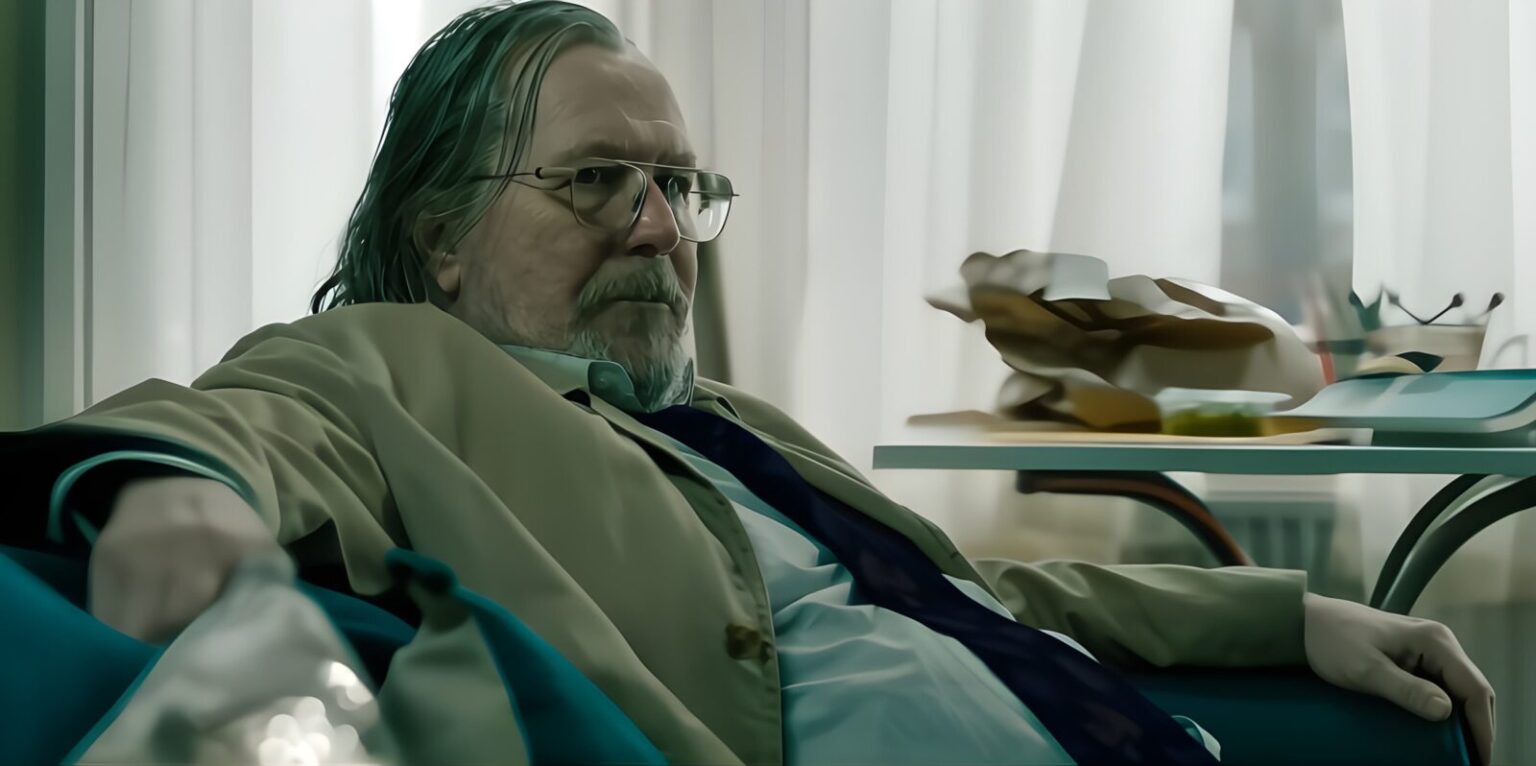TL;DR: Claude Whelan takes off his shoes, finds his spine, and Slow Horses continues to prove that failure has never looked so good.
Slow Horses
There’s a particular kind of Britishness that Slow Horses captures better than almost any modern show about espionage. It’s not the slick, martini-soaked world of Bond or the brooding bureaucratic coldness of Tinker Tailor Soldier Spy. No, this one is something else entirely—a stew of self-loathing, sarcasm, and snack crumbs. It’s the kind of spy story that starts with a hangover and ends with a passive-aggressive email. By the time you reach Season 5, Episode 4 (titled Missiles), you realize that this isn’t just a story about MI5 rejects. It’s about all of us who’ve ever stared into a screen, sighed deeply, and muttered, “God, I hate this place,” before getting back to work anyway.
I’ve been watching Slow Horses since its first season dropped on Apple TV+, mostly out of curiosity—a British spy show led by Gary Oldman, based on Mick Herron’s Slough House novels, which I’d devoured in paperback years earlier. But somewhere between Jackson Lamb’s gas-lighting one-liners and River Cartwright’s quiet despair, the show stopped being a guilty pleasure and became a weird kind of comfort. The series is, at its heart, a hymn to failure—and to the people who live there.
Which brings us to Episode 4 of Season 5, a perfectly British showdown where the gloves come off, and, apparently, so do the shoes.
The Bureaucrat Who Finally Snapped (While Wearing Seahorse Socks)
Claude Whelan, the long-suffering MI5 boss played by James Callis (yes, Battlestar Galactica’s Gaius Baltar himself), has spent four and a half seasons being everyone’s favorite bureaucratic punchline. He’s a man who looks like he’d apologize to a vending machine for not having exact change. Until now.
Episode 4, titled Missiles, is his coming-of-age story, if you can call late-stage political blackmail and domestic humiliation a kind of coming-of-age. It’s the moment Claude stops being a background suit and becomes something resembling a human being with an actual pulse—and, importantly, a pair of ridiculous purple seahorse socks.
When Claude turns up at Dodie Gimball’s house (the sharp-tongued, journalist wife of a right-wing London mayoral candidate), he means business. Well, British business—which is to say, he brings information instead of intimidation. He plans to confront her about the blackmail she’s been holding over him since Episode 1. But instead of a dramatic, Bond-like standoff, we get a scene that plays out more like The Office: Espionage Division.
Dodie makes him take off his shoes before entering her living room—a subtle, almost sadistic act of control—and suddenly this supposed MI5 leader is standing there, trying to defend national security in novelty socks. It’s humiliating, hilarious, and deeply British. And yet, Claude fights back. He reveals Dodie’s own dirty secrets—that she once sold out her Marxist boyfriend, that her political ambitions have always been built on betrayal. For once, Claude gets the upper hand. Barefoot, no less.
It’s a perfect encapsulation of what Slow Horses does best: making the absurd feel profound, the pathetic feel powerful. In lesser hands, this scene would be played for laughs. But under Apple’s sleek lighting and Callis’s nervous gravitas, it becomes something close to catharsis. A man finally standing up for himself—even if he has to do it in socks covered with tiny aquatic creatures.
The Art of Failing Forward
Every season of Slow Horses walks a tightrope between satire and sincerity. The show constantly reminds us that its characters—the so-called “Slow Horses” of Slough House—are there because they screwed up. They’re spies who failed in spectacular, bureaucratically tragic ways. Left a briefcase on a train. Blew an op because they got lost in translation. Or, in River Cartwright’s case, tanked an entire career over a training simulation gone wrong. And yet, these broken people are the ones who keep saving London, again and again.
There’s something almost religious about that cycle of disgrace and redemption. Lamb, played with delicious vulgarity by Gary Oldman, presides over his flock like a chain-smoking archangel of failure. He belches wisdom between bites of cold takeaway, reminding them (and us) that the only people who can afford to care about the world are those who know how much it stinks.
By Season 5, that dynamic has calcified into ritual. We know how it goes: an incident erupts, MI5 proper panics, the Slow Horses stumble in, get insulted by Lamb, trip over the truth, and accidentally save the day. It’s part workplace comedy, part political farce, part existential lament. But Episode 4 shakes the formula in the smallest, smartest way—by giving someone outside Slough House their moment of awakening.
Claude Whelan, in that living room, is every British worker who’s ever realized that politeness doesn’t protect you, and decency doesn’t get you promoted. Sometimes you have to take off your shoes and fight anyway.
Spies, Bureaucrats, and the Myth of Competence
Watching Slow Horses is like watching a national therapy session disguised as a spy show. It takes the British obsession with hierarchy, manners, and quiet misery, and holds it under a fluorescent light. Everyone in MI5 is smart, yes, but no one is particularly competent. The system itself is a comedy of errors.
That’s what makes Claude’s small rebellion in Missiles so satisfying. We’ve seen him bumble through meetings, get outmaneuvered by his own subordinates, and hide behind the chain of command. But here, he finally recognizes the futility of playing nice in a world built on compromise. The power dynamics are no longer about rank or paperwork—they’re about who’s willing to stand their ground while barefoot in enemy territory.
And let’s talk about that detail—the shoes. British TV has long used footwear as metaphor, from Sherlock’s polished brogues to Doctor Who’s Converse trainers. But here, the act of removing them is more than comic emasculation. It’s symbolic surrender. Whelan is stripped of pretense, robbed of decorum, and forced into raw humanity. When he stands up to Dodie afterward, it feels like a small revolution—an act of rebellion carried out in the least cinematic way possible.
Humor as a Weapon
One of the things I love most about Slow Horses is how it uses humor not as relief, but as resistance. The laughter in this show isn’t the tidy kind that clears the air; it’s the choking, despairing kind that comes from realizing the world will never make sense. When Lamb cracks a joke about bureaucratic incompetence or farts in the middle of a debriefing, it’s not just to make you laugh—it’s to remind you that even the apocalypse can be stupid.
Episode 4 leans into that tonal genius. The scene with the seahorse socks could have been slapstick, but instead, it’s played with a quiet, mortifying tension. The humor seeps in through the cracks, making the moment both ridiculous and oddly empowering. It’s the essence of Slow Horses: laughing not at the absurdity of others, but at the shared absurdity of existence.
The Slow Horses Legacy
By now, Slow Horses has evolved from cult hit to cultural fixture. Apple TV+ struck gold by adapting Herron’s novels into something that feels both timeless and perfectly of-the-moment. In a post-Brexit, post-truth Britain, there’s something cathartic about a show that celebrates the people the system discards. Every episode reminds us that the world isn’t run by heroes, but by tired, underpaid, over-caffeinated people who keep showing up anyway.
Episode 4 of Season 5 might not have the explosions or grand conspiracies that drive the show’s headlines, but it captures its soul. It’s about quiet defiance, personal dignity, and the deeply British art of pretending everything’s fine while standing in your socks.
Final Thoughts
As Missiles closes, Claude Whelan walks away from Dodie’s house, not exactly victorious but no longer afraid. The city is still in chaos, bombs may still be ticking, and Lamb is probably still insulting someone in a pub. But for one shining, ridiculous moment, the bureaucrat became the spy, and the man in the seahorse socks reminded us why Slow Horsesremains one of the best shows on television.
Because at its heart, this isn’t a show about espionage. It’s a show about endurance—about what it means to keep showing up, even when the world mocks you for it.







